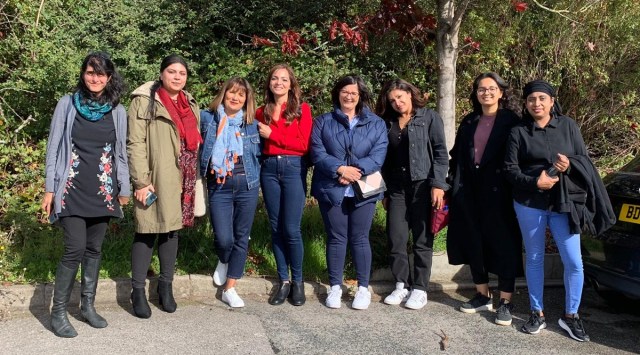Divya Goyal is a Principal Correspondent with The Indian Express, based in Punjab. Her interest lies in exploring both news and feature stories, with an effort to reflect human interest at the heart of each piece. She writes on gender issues, education, politics, Sikh diaspora, heritage, the Partition among other subjects. She has also extensively covered issues of minority communities in Pakistan and Afghanistan. She also explores the legacy of India's partition and distinct stories from both West and East Punjab. She is a gold medalist from the Indian Institute of Mass Communication (IIMC), Delhi, the most revered government institute for media studies in India, from where she pursued English Journalism (Print). Her research work on “Role of micro-blogging platform Twitter in content generation in newspapers” had won accolades at IIMC. She had started her career in print journalism with Hindustan Times before switching to The Indian Express in 2012. Her investigative report in 2019 on gender disparity while treating women drug addicts in Punjab won her the Laadli Media Award for Gender Sensitivity in 2020. She won another Laadli for her ground report on the struggle of two girls who ride a boat to reach their school in the border village of Punjab. ... Read More
‘Partition Curriculum’: Group of educators aim to bring British colonial history to UK schools
Kaur is among a group of professionals from the education sector in the UK, including schoolteachers, trainers, researchers and others, who have come together to start a campaign aimed at bringing South Asian British colonial history and India’s Partition in more detail into the school curriculum in Britain.
 The group working on ‘Partition Curriculum’ campaign. Express
The group working on ‘Partition Curriculum’ campaign. ExpressBorn and brought up in London, with her parents tracing their roots to Kapurthala in Punjab, 44-year-old Sandeep Kaur says she regrets not being taught enough in school about the intertwined history of the country where she lives and the country of her roots. She is now part of a campaign to change this.
“It has only been a couple of years that I have actually come to know — through family, the Internet and other external sources — about the several detailed aspects of British rule in India, the repercussions of Partition, the mass migration, violence, communal riots and the lingering pain that people continue to suffer, and most importantly, the level of abuse of power that the British practised at the time,” says Kaur, an associate head teacher at a primary school.
Her two children now have the same experience that she had in school — having to learn about British colonial rule from external sources.
“There is hardly any mention of Partition or British colonial history in India and South Asia, the creation of Pakistan, and other aspects in their school curriculum. Just like me, they are only learning about it through family and other external sources. My elder one has now started questioning why they aren’t being taught unbiased aspects of the British Empire in India in their school. It is high time for the UK to realise that the division of India was just not about India and Pakistan, but was very much a British story which the younger generation growing up here — those of both British and South Asian origin — need to learn. It is something that is affecting us even today. It is our shared history,” Kaur says.
Kaur is among a group of professionals from the education sector in the UK, including schoolteachers, trainers, researchers and others, who have come together to start a campaign aimed at bringing South Asian British colonial history and India’s Partition in more detail into the school curriculum in Britain.
The Partition Education Group mostly consists of schoolteachers who were born and brought up in the UK, but trace their origin to India or Pakistan. Many of the teachers in the group had their parents or grandparents moving to the UK from Punjab years after partition displaced them, and they came to the UK to rebuild their lives. The group is currently in the process of developing a unique “Partition Curriculum” for primary and secondary classes and plan to introduce it in schools as a pilot project soon.
“It is the details of it that are missing. Even as everyone is aware of key figures such as Mahatma Gandhi or (Mohammad Ali) Jinnah, our generation of British Indians, who were born and brought up in the UK, were never taught about how Hindus, Muslims and Sikhs lived in peace and harmony before Partition, and the role that the British played in this mayhem. The need for this project was felt because there are several lessons to be learnt from this history. Our parents or grandparents came to the UK as immigrants and some still face racial bias here, but then it was all because of Partition and what the British did that they had to move. So many South Asians had to migrate to the UK because they were displaced. I realised that I learnt nothing about this history in school and this needs to change,” Kaur says.
The core group comprises eight education professionals. They also train teachers and make them aware of the campaign, and contact schools to get the Partition Curriculum included in their syllabi. “We do follow a National Curriculum here in the UK, but then school heads also have the autonomy and liberty to include something that they feel is significant and important for children. We are also speaking to stakeholders in government to get the curriculum accepted officially as a part of the history syllabus,” she says.
Ballie Kaur, 42, one of the pedagogy experts working to train the teachers, says she was shocked to learn only recently that her paternal grandmother, who was from Lahore, had to dress as a man and carry a rifle for protection as she walked several miles to get a train to the Indian side during the time of Partition.
“My family later moved to the UK for a better life, but when we connect the dots, it’s all connected,” said Ballie Kaur, who traces her roots to Jalandhar. “We came to the UK as immigrants, but we had to come only because of British actions. Until a couple of years ago, I was really not aware of the consequences of Partition and the psychological trauma it left behind for people from both sides. Hardly anything related to violence, bloodshed, the events that led up to Partition, etc is being taught to students here, which we aim to change,” she says, adding, “For our older generations who moved to the UK, it is too much of a trauma, and they don’t want to talk about it to their children. They want to leave that pain behind, so there’s hardly any source for children to learn if not in schools.”
Pepe Hart, whose mother came to the UK from Mumbai and her father from Pakistan, is another member of the group. “We are a group of professionals from the education and culture sector who want to encourage and facilitate increased engagement with the history of South Asia in the UK. We want school curricula at both primary and secondary levels to better represent the history and heritage of our multicultural society in Britain and acknowledge the impact of the British Empire and the results of colonialism. Teachers should be empowered to explore issues around colonialism and its impact on society. Children should have access to knowledge and understanding of this significant period in British history and we seek to demonstrate that South Asian history is also British history,” Hart says.
The group’s founder and chair, Raj Unsworth, 63, was born in Punjab’s Banga and came to the UK when she was just seven. She has been a governor/trustee in the UK education sector for 27 years, and is also the chair of a primary school in Bradford. “When I started learning about British history in India and the aftermath of Partition, I started questioning my father. Why did he never tell me all this? I have three sons who have gone through the same in their schools. People with their roots in India and Pakistan still face racism in the UK because natives here aren’t aware of our shared history,” she says.
“We are developing lesson plans — for primary kids (aged 8 to 10) and secondary (aged 11 to 13). These are a series of lessons starting with the British Empire, the East India Company, key events such as the 1857 mutiny, Jallianwala Bagh, famines, Partition, the key figures involved, mass migration, violence, killings, and their impact on ordinary people even today. We Indians are here (in the UK) today because you (the British) were there (in India). We will just be sticking to facts in our curriculum lessons,” she says.



- 01
- 02
- 03
- 04
- 05




























